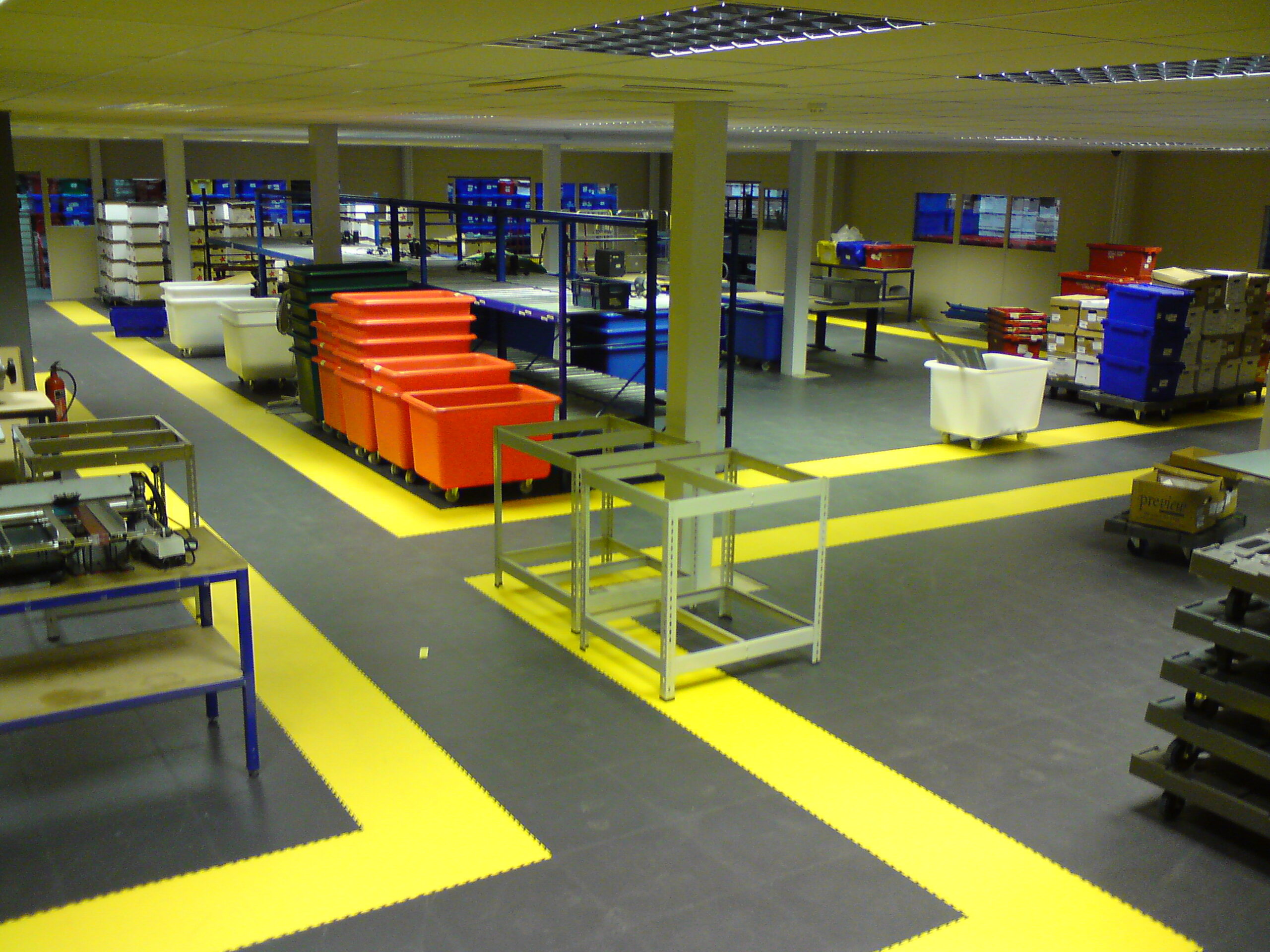When it comes to warehouse flooring, durability and functionality are paramount. In this comprehensive guide, we will delve into the world of PVC warehouse floor tiles, exploring their benefits, types, installation process, maintenance, and much more. By the end of this article, you’ll be well-equipped to make an informed decision about the perfect PVC floor tiles for your warehouse.
Why Choose PVC Warehouse Floor Tiles?
PVC, or polyvinyl chloride, warehouse floor tiles have gained immense popularity in recent years, and for good reason. Here are some compelling reasons why you should consider them for your warehouse:
- Durability: PVC floor tiles are known for their exceptional durability, able to withstand heavy traffic, impact, and wear and tear. This makes them ideal for high-traffic areas like warehouses.
- Easy Maintenance: PVC floor tiles are a breeze to clean and maintain. Their smooth surface resists stains and can be easily wiped clean, reducing downtime for cleaning and maintenance.
- Versatility: These tiles come in a variety of designs, colours, and thicknesses, allowing you to choose the perfect style that matches your warehouse’s aesthetics.
- Cost-Effective: PVC warehouse floor tiles are cost-effective in the long run. They have a long lifespan, reducing the need for frequent replacements, and can be installed without costly adhesives.
Types of PVC Warehouse Floor Tiles
Before you make a choice, it’s crucial to understand the different types of PVC floor tiles available:
- Interlocking Tiles: These tiles are designed to fit together like a puzzle, making installation a simple DIY project. They are great for warehouses that need a quick and easy flooring solution.
- Glue-Down Tiles: These tiles require adhesive for installation, providing a more permanent flooring solution. They are suitable for warehouses with heavy machinery and constant traffic.
- Roll-Out PVC Flooring: This type of flooring comes in rolls and is ideal for large warehouses where seamless flooring is desired. Installation is quick, and they offer excellent chemical resistance.
- Anti-Static PVC Tiles: For warehouses with sensitive electronic equipment, anti-static PVC tiles are essential. They dissipate static electricity, preventing damage to electronic components.
Choosing the Right Thickness
The thickness of your PVC warehouse floor tiles is a critical factor in their performance. Thicker tiles are more durable and suitable for heavy-duty applications. Here are some common thickness options:
- 5mm and below: These are light-duty tiles suitable for areas with low to moderate traffic, like storage rooms.
- 6mm to 8mm: Medium-duty tiles that can withstand moderate traffic and are ideal for most warehouse environments.
- 9mm and above: Heavy-duty tiles built to withstand high traffic and heavy machinery, making them perfect for industrial warehouses.
Installation Process
Installing PVC warehouse floor tiles can be a straightforward process, especially for interlocking tiles. Here’s a basic overview:
- Preparation: Ensure your subfloor is clean, flat, and free of debris.
- Layout: Start by marking the center of the room and laying tiles outward from there. If using adhesive, follow the manufacturer’s instructions.
- Cutting: Use a utility knife to cut tiles to fit around corners and edges.
- Interlocking: For interlocking tiles, simply fit the pieces together like a jigsaw puzzle.
- Sealing: Some PVC tiles may require sealing for added protection. Follow the manufacturer’s recommendations.
Maintenance Tips
PVC warehouse floor tiles are low-maintenance, but a few simple steps can ensure they last for years:
- Regular Cleaning: Sweep or vacuum the floor to remove debris, then mop with a mild detergent and water.
- Stain Removal: For stubborn stains, use a soft brush or a damp cloth with a mild solvent.
- Avoid Harsh Chemicals: Harsh chemicals can damage the PVC surface, so use only recommended cleaning products.
- Inspect Regularly: Check for any loose or damaged tiles and replace them promptly.
Selecting the Perfect PVC Warehouse Floor Tiles
Selecting the perfect PVC warehouse floor tiles involves considering a range of factors tailored to your specific warehouse requirements. Here are some additional insights to assist you in making a well-informed decision:
Consider Warehouse Activities
The nature of activities in your warehouse plays a crucial role in determining the ideal PVC floor tile. For example:
- Storage Warehouses: If your warehouse primarily involves storage and retrieval of goods, you can opt for lighter-duty PVC tiles, as these areas typically have less foot and equipment traffic.
- Manufacturing Facilities: Warehouses involved in manufacturing processes with heavy machinery and equipment should lean towards thicker and more durable PVC tiles. These can withstand the stress and impact associated with such operations.
Safety and Ergonomics
Safety should always be a top priority in a warehouse setting. PVC warehouse floor tiles can contribute to a safer working environment in several ways:
- Anti-Slip Properties: Look for PVC tiles with anti-slip features, especially if your warehouse often deals with spills or wet conditions. This reduces the risk of accidents.
- Ergonomic Benefits: Consider the comfort of your employees. Some PVC tiles offer cushioning, which can reduce fatigue and stress on the feet and joints of workers who stand for long periods.
Environmental Considerations
Sustainability is a growing concern for many businesses. If you want to make an eco-conscious choice, consider PVC floor tiles that are:
- Recyclable: Some PVC tiles are recyclable, reducing their environmental impact when they reach the end of their lifespan.
- Low VOC: Volatile organic compounds (VOCs) can be harmful to indoor air quality. Choose PVC tiles with low VOC emissions to ensure a healthier workspace.
Budget and Long-Term Costs
While PVC warehouse floor tiles are cost-effective in the long run, it’s essential to consider your budget and the potential long-term costs. Keep these points in mind:
- Upfront Costs: Thicker and more specialized PVC tiles may come at a higher initial cost. Evaluate your budget to determine the most suitable option.
- Longevity: Consider the lifespan of the tiles. While thicker tiles may have a higher initial cost, they can outlast thinner ones, reducing the need for frequent replacements.
Customisation and Branding
PVC warehouse floor tiles can be customized to reflect your brand or create designated pathways within the warehouse. This is an excellent way to enhance the aesthetics of your workspace and improve navigation for employees.
Consult with Experts
If you’re unsure about the best PVC warehouse floor tile solution for your specific needs, consider consulting with flooring experts or manufacturers. They can provide valuable insights, recommend suitable products, and even assist with installation.
Conclusion
Choosing the right PVC warehouse floor tiles can significantly impact the functionality and aesthetics of your space. With their durability, easy maintenance, and versatility, PVC tiles are an excellent choice for warehouses of all sizes and industries. Be sure to consider the type, thickness, and installation method that best suits your specific needs, and your warehouse will enjoy a long-lasting and dependable flooring solution.



